THE MORAL DEGENERACY OF GOD’S PEOPLE GONE GODLESS; 
You will notice that the author of the Book of Judges has prefaced what is written in Chapters 18 and 19 with the comment, “Now it came about in those days that there was no king in Israel”.
He reminds us where these incidents took place in the context of Israel’s story. Yes, these events took place before the days of Israel’s monarchy, but in the context of the larger drama of human redemption, these events dramatically illustrate the horror of the human condition as it casts off the restraint of moral accountability. The author makes it clear– there is no sense of God’s kingship in the lives of the people here.
The final chapters of the Book of Judges describe the extent and swiftness of the spiritual and moral declension in Israel. We see a similar pattern of degeneracy in the history of great civilizations in the past. We see it also in the trajectory of our society today:
The prophet Isaiah reminds us of what is in store:
“Woe to those who call evil good, and good evil;
Who substitute darkness for light and light for darkness;
Who substitute bitter for sweet and sweet for bitter!” (Isaiah 5:20)
We see symptoms of the demise of our own society when that which is forbidden in Scripture is applauded and that which is sacred is disdained. The media glorifies the occultic and doctrine of demons. Holy matrimony and fidelity are considered perverse, sodomy is now considered sacrosanct. It is deemed politically incorrect to speak of our need for this world’s only Savior and the prospect of His return.
In Chapter 19, a man from the priestly tribe of Levi, who had been entrusted with the sacred duty of upholding the Law of God and promoting worship throughout Israel, experiences a domestic crisis. He had taken a concubine from Bethlehem Judah and moved to the hill country of Ephraim rather than the place of God’s assignment, one of the cities designated for the Levites to inhabit. His concubine proves to be unfaithful. She flees to Bethlehem to take refuge in her father’s house, perhaps because she fears the revenge of her husband, or the Law, as adultery was punishable by death.
Four months later, her husband, the Levite, has found it in his heart to forgive her of her infidelity. He travels to Bethlehem Judah, discovers her at her father’s house, and they are reconciled. He and his father-in-law rediscover the joy of one another’s company. They party with three days of eating, drinking and making merry. The Levite seems to be enjoying his father-in-law’s company more than the common law wife he sought to win back.
The Levite and his concubine intend to leave on the fourth day. The father begs them to have breakfast before they go. They start pouring drinks and they continue to enjoy wine, food, and more good chatter. The day slips by until it is evening.
Warren Wiersbe comments that
“this Levite illustrates the careless attitude of many believers today. They are children of the day but they act like children of the night (1 Thess 5:1-8). Judgment is around the corner, but these people think of nothing but enjoying life. When his nation was so far from God, how could this Levite waste his time eating, drinking and making merry?
Had this laughing Levite been walking in the light, praying and seeking God’s will, he would have made other plans and saved his wife from shame, abuse, pain and death.” (Wiersbe, Bible Exposition Commentary)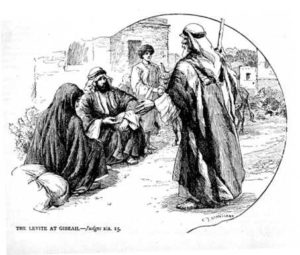
The father of the Levite’s concubine persuades his daughter and the Levite to stay another night. The fifth day is similar to the previous days of drinking, except when the father begs them to stay another night, the Levite refuses. In the period of Judges, it was dangerous and sometimes too hot to travel by day. It was also dangerous at night. The couple depart Bethlehem and travel to Jebus (Jerusalem) with a pair of saddled donkeys and a servant. The Levite’s servant suggests they spend the night in Jebus, but because it is inhabited by Jubusites, considered pagan foreigners, the Levite refuses. We suppose he thought it was far too dangerous to put themselves into the hands of pagans at night. Instead he chose what he believed to be a safer option, to travel four miles up the road to Gibeah where he would be warmly and safely received by his own people. Gibeah was part of the inheritance of the tribe of Benjamin. Surely, they would treat them well.
When they came into the open town square in Gibeah, no one came out to offer them hospitality. Only one man showed any concern at all. He was an old man who was also originally from the hill country of Ephraim. He now owned a house in Gibeah and was coming into town from working in the fields. He offers to take the Levite and his concubine and young servant into his house, warning them not to spend the night in the open square.
While they celebrated in the Ephraimite’s home, the men of Gibeah came outside and surrounded the house, banging on the door and demanding that the Ephraimite surrender the Levite, his male houseguest, to their sexual lusts (19:22). The owner of the house went outside to plead with his neighbors to not act so wickedly.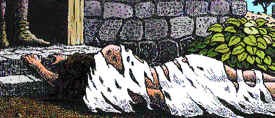
When he realizes that the crowd will not take no for an answer, he surrenders his daughter and the Levite’s concubine instead. (Notice the sad similarities to Genesis 19). The Benjamites gang rape the Levite’s concubine and abuse her all night. In the morning her unresponsive body is discovered at the doorway of the Ephraimite householder.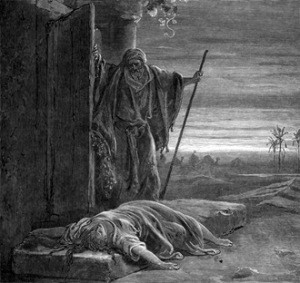
The woman had been there since the first light of dawn with her hand clutching the threshold but the master did not open the door until full daylight. The Levite callously says, “Get up and let us go”, but there was no answer. He placed her on the donkey and took her to his home. He then cut the body into 12 pieces and sent her body pieces to each of the 12 tribes of Israel. This was more than a personal tragedy; it was a national tragedy. Horrifically, this is what the nation had come to. This was a disgrace. “Righteousness exalts a nation, but sin is a disgrace to any people” (Prov 14:34).
All who saw it said, “Nothing like this has ever happened or been seen from the day when the sons of Israel came up from the land of Egypt to this day. Consider it, take counsel, and speak up!” (Judges 19:30)
Consider it- the sinfulness of sin. The heart that is ruled by self, that demands to be free from moral accountability and responsibility, is in desperate need for the righteous rule of God.
“The heart is more deceitful than all else and is desperately sick; Who can understand it? (Jeremiah 17:9 (NASB)
Where is a man after God’s heart? The Book of Judges leaves us with a yearning for a worthy Savior.
Proverbs 20:6 (NIV) 6 Many a man claims to have unfailing love, but a faithful man who can find?
It has been said that this chapter holds up a mirror to the time when people did what was right in their own eyes. It is interesting that a popular newspaper is called “The Daily Mirror”. We read stories daily of atrocious crimes and brutality that mirror the depraved condition of the human heart.
What the priest does to get the attention of the nation is drastic. But the symbolism is clear. The nation, through its turning away from God to serving its own idols (Judges 18), had gone the way of a degeneracy that defies description. And it will bring about the nation’s dismemberment.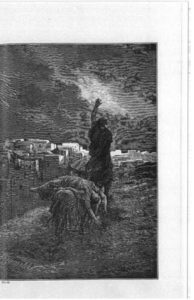
It would lead to a civil war.
The tribes of Israel would tithe their fighting men and supplies to go to war against the tribe of Benjamin.
They give the people of Gibeah the opportunity to surrender those guilty of the crime, but they refuse.
The sons of Israel inquire of the Lord as to how to put right this wrong. The horror of the sin at Gibeah revitalizes a previously suppressed moral conviction.
G Campbell Morgan writes,
“In the midst of the most soiled and debased times, in the presence of some more than usually violent manifestation, the slumbering convictions of a people will flame into new sensitiveness and demand recognition. In response to the ghastly and bloody appeal of the Levite, Israel gathered itself together before God, seeking to know how to act.
The low level of morality which had manifested itself in so fearful a form, could only be dealt with by general suffering. The men who were in the wrong were brutally defiant. Moreover, they were strong enough at first to defeat the army of Israel. This fact at least suggests that Israel was not clean enough herself to punish wrongdoers. Again, the people gathered before God, and this time in weeping and lamentation. After this, they went forward, this time to victory and the core punishment of the sinning people, and those who had condoned their sin. Thus, not Israel, but God, smote Benjamin.” (Morgan, Searchlights in the Word)
NEW TESTAMENT READING: John 3:22-4:3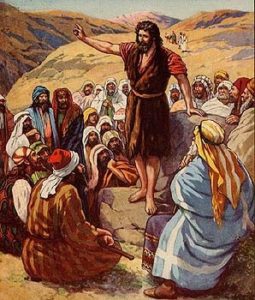
Jesus was giving His disciples the gift of time. In Judea “He was spending time with them and baptizing” (John 3:22). This verse needs to be understood in the light of the apostle John’s parenthetical statement that is to follow—(although Jesus Himself was not baptizing, but His disciples were; John 4:2).
The baptism of John symbolized repentance, a recognition of sin and the need for purification– to come clean before the Lord. But repentance alone does not put a man in a right relationship with God. If righteousness could come by the Law, then the saving mission of Jesus coming to die on the cross would be unnecessary. Something more is needed. Our history in Adam needs to be concluded and put away as dead. We need a new life and new history in Christ. There is a need for the burial, bathing and birth that is pictured in baptism and fulfilled in Christ.
John’s disciples are having a discussion about purification and how the work of John the Baptist compares with the work of Jesus. John clarifies that his role is that of the forerunner of the Anointed One. In the New Testament era, the ‘friend of the bridegroom’ responds to ‘the voice of the bridegroom’ and calls people to the wedding.
John points to The Anointed One, the Bridegroom, who is The Word of God. John the Baptist’s joy is complete in that he recognizes in Jesus the Bridegroom’s voice and sees that his life mission to ‘prepare the way of the Lord’ is fulfilled. Like John, we should be overjoyed when people turn to Jesus. We should do our part to help them do so.
There is no greater joy than to know Christ and make Him known. There is no greater joy than to see Him increase. We preach not ourselves but Christ Jesus the Lord.
John’s final testimony is one in which he emphasizes the distinctiveness of Jesus Christ, with seven contrasts between His personal attributes and ministry with those of others, including himself.
- John, like any man, can receive nothing unless it has been given him from heaven, (3:27) yet Jesus has been given ALL THINGS by His loving Father (3:35).
- John says that he himself is not the Christ (v.28) but was sent before Him (referring to Jesus as The Appointed Messiah- v.28).
- John was a friend to the bridegroom, but Jesus was and is The Bridegroom (v.29).
- John must decrease, Jesus must increase (v. 30).
- John was ‘of the earth’; Jesus was from above and is above all (v. 31).
- John had a measure of the Spirit; Jesus had the Spirit without measure (v.34.)
- John was a servant; Jesus was more than a servant- He was the Son of the Father (v.35).
John is sent to bear witness to what he has seen and heard. So are we. Apart from a miracle of grace, this witness is despised and rejected (3:27,32). When people receive our testimony, it is a work of the Spirit, and they set their seal to this fact, that God is true.
The summary of John’s testimony is found in verse 36:
John 3:36 (NASB) 36 “He who believes in the Son has eternal life; but he who does not obey the Son will not see life, but the wrath of God abides on him.”
TODAY’S PSALM
Psalm 104:24-35;
Psalm 104:24 O LORD, how many are Your works! In wisdom You have made them all; The earth is full of Your possessions.
The One Who created all things, created us. We are created to relate to Him by faith with a three-fold interlock of trust– loving Him, being dependent upon Him, and obeying Him.
An objective for this day: “May all my thoughts be pleasing to Him, for I rejoice in the Lord” (Psalm 104:34).
PROVERB FOR TODAY: Proverbs 14:22-24 (NASB) 22 Will they not go astray who devise evil? But kindness and truth will be to those who devise good. 23 In all labor there is profit, But mere talk leads only to poverty. 24 The crown of the wise is their riches, But the folly of fools is foolishness.
What is your action plan today? What good things have you devised?
PRAY FOR THE NATIONS
(from the Prayer Guide “OPERATION WORLD”)
TODAY: CROATIA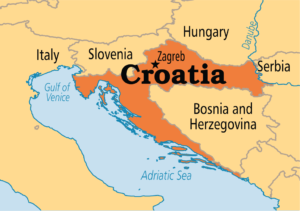
Croatia
Republic of Croatia
Europe
Geography
Area: 56,438 sq. km
Crescent-shaped country between the Danube River and Adriatic Sea. The land is almost bisected by Bosnia.
Population: 4,409,659 Annual Growth: -0.15%
Capital: Zagreb
Official language: Croatian – closely related to Serbian but written in Latin rather than Cyrillic script
Challenge for Prayer
The profound impact of historic and recent hatred among Croat, Serb and Bosnian could continue to hamper the affected nations for generations to come. The iron bond shackling ethnicity to religion also hampers progress and stifles spiritual breakthrough. Many suffer continued psychological and emotional trauma as a result of the upheavals, and little has been done to address this. It is an area where churches might have a great impact. Pray for true reconciliation and for the religious and ethnic bondages to be broken – these can only happen through the power of Christ.
The Catholic Church is highly influential in Croatia. About 15% of Catholics regularly attend mass – a high proportion for Europe. Some Catholic leaders are at the forefront of the reconciliation movement and some cooperate with evangelicals. There is a small but active charismatic movement within the Catholic Church, but a significant shortage of young men joining the priesthood. Pray that all Croatians would move beyond empty rituals to a living relationship with Jesus.
PRAYER: Father, may we all be faithful witnesses, signposts to Jesus, this world’s only Savior and truly worthy King. We abhor the decadent history of the human race, so easily given to the reign of sin and repent of our repugnant idolatries. We ask that the restoration of Your rule through King Jesus would take root in our hearts, in our families, nations and unite the church of the Lord Jesus with the singular life passion to bring glory to Your Name. We thank You for the demonstration of Your loving wisdom in the cross. Our Adamic history has rightfully been condemned and put to death. Now reign in our hearts by the power of the Spirit. In Jesus’ Name. Amen.
-Pastor David
So, naturally, we proclaim Christ! We warn everyone we meet, and we teach everyone we can, all that we know about him, so that, if possible, we may bring every man up to his full maturity in Christ. (Colossians 1:28, J.B. Phillips paraphrase)
New Life Community Church, Concord, MA 10742
www.newlife.org
